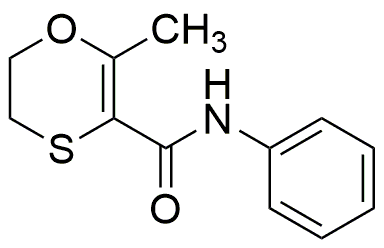Carboxin is widely utilized in research focused on:
- Agricultural Fungicide: It is primarily used as a seed treatment to protect crops from fungal diseases, enhancing seed germination and plant health.
- Plant Protection: Carboxin helps in controlling soil-borne pathogens, making it invaluable in the cultivation of crops like wheat and barley, thereby increasing yield and quality.
- Research in Plant Pathology: Researchers use it to study the effects of fungal infections on plants, providing insights into disease resistance and management strategies.
- Development of New Formulations: The compound is used in the development of advanced fungicide formulations, improving efficacy and reducing environmental impact compared to older chemicals.
- Integrated Pest Management (IPM): Carboxin plays a role in IPM strategies, allowing farmers to combine chemical and biological controls for sustainable agriculture.
Información general
Propiedades
Seguridad y normativas
Aplicaciones
Carboxin is widely utilized in research focused on:
- Agricultural Fungicide: It is primarily used as a seed treatment to protect crops from fungal diseases, enhancing seed germination and plant health.
- Plant Protection: Carboxin helps in controlling soil-borne pathogens, making it invaluable in the cultivation of crops like wheat and barley, thereby increasing yield and quality.
- Research in Plant Pathology: Researchers use it to study the effects of fungal infections on plants, providing insights into disease resistance and management strategies.
- Development of New Formulations: The compound is used in the development of advanced fungicide formulations, improving efficacy and reducing environmental impact compared to older chemicals.
- Integrated Pest Management (IPM): Carboxin plays a role in IPM strategies, allowing farmers to combine chemical and biological controls for sustainable agriculture.
Documentos
Hojas de datos de seguridad (HDS)
La SDS proporciona información de seguridad completa sobre la manipulación, el almacenamiento y la eliminación del producto.
Especificación del producto (PS)
La PS proporciona un desglose completo de las propiedades del producto, incluida la composición química, el estado físico, la pureza y los requisitos de almacenamiento. También detalla los rangos de calidad aceptables y las aplicaciones previstas del producto.
Certificados de análisis (COA)
Busque certificados de análisis (COA) ingresando el número de lote del producto. Los números de lote y de partida se pueden encontrar en la etiqueta de un producto después de las palabras "Lote" o "Lote".
Número de catálogo
Número de lote/lote
Certificados de origen (COO)
Este certificado de origen confirma el país en el que se fabricó el producto y también detalla los materiales y componentes utilizados en él y si se deriva de fuentes naturales, sintéticas u otras fuentes específicas. Este certificado puede ser necesario para cumplir con las normativas aduaneras, comerciales y regulatorias.
Número de catálogo
Número de lote/lote
Hojas de datos de seguridad (HDS)
La SDS proporciona información de seguridad completa sobre la manipulación, el almacenamiento y la eliminación del producto.
DownloadEspecificación del producto (PS)
La PS proporciona un desglose completo de las propiedades del producto, incluida la composición química, el estado físico, la pureza y los requisitos de almacenamiento. También detalla los rangos de calidad aceptables y las aplicaciones previstas del producto.
DownloadCertificados de análisis (COA)
Busque certificados de análisis (COA) ingresando el número de lote del producto. Los números de lote y de partida se pueden encontrar en la etiqueta de un producto después de las palabras "Lote" o "Lote".
Número de catálogo
Número de lote/lote
Certificados de origen (COO)
Este certificado de origen confirma el país en el que se fabricó el producto y también detalla los materiales y componentes utilizados en él y si se deriva de fuentes naturales, sintéticas u otras fuentes específicas. Este certificado puede ser necesario para cumplir con las normativas aduaneras, comerciales y regulatorias.


